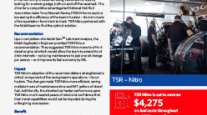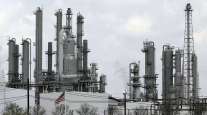Diesel Rises Again; DOE Sees $3.40 Average Into Spring
By Michael G. Malloy, Staff Reporter
This story appears in the Jan. 14 print edition of Transport Topics.
Diesel fuel prices rose again last week, gaining 3.1 cents to $3.376 a gallon in the Department of Energy’s weekly average of filling stations. DOE said average gasoline prices increased 5.6 cents to $3.109.
In a separate report, the agency said diesel prices are likely to continue at near-record levels of at least $3.40 a gallon into the spring before ebbing later in the year.
One trucking executive said last week there does not appear to be much relief in sight. “Diesel fuel became our highest expense item last month, exceeding drivers’ wages for the first time ever,” said Glen Merkel, president of Davis Cartage Co. in Corunna, Mich.
“We recoup the majority through fuel surcharges, but we still end up eating about 15% of the increased costs, which is hitting our bottom line,” said Merkel. He said Davis operates a 76-truck fleet for truckload and less-than-truckload operations.
The latest increases came on the heels of record crude oil prices, which topped $100 a barrel for the first time in early January and left diesel 83.9 cents a gallon higher than the corresponding week of 2007; gasoline is now 80.3 cents more than a year ago.
Diesel has gained 6.8 cents over the past two weeks, while gas was 12.9 cents higher. Those increases raised trucking’s costs per week by $50 million for diesel and $36 million for gasoline, based on American Trucking Associations’ estimated trucking industry weekly burn rates of 730 million gallons of diesel and 280 million gallons of gasoline.
Scott Davis, UPS Inc.’s chief executive officer, said last week that soaring fuel prices could crimp economic growth this year, Bloomberg News reported.
“I never would have dreamed we’d push $100 oil today, based on the fundamentals” in the petroleum industry, Davis said.
One trucking executive said last week the spiraling prices were forcing carriers to take as many measures as possible to save money on fuel.
“When we look at that fuel bill, we know there are only so many things we can control,” said Rick Adams, a driver recruiter for truckload carrier Volume Transportation in Atlanta.
Volume — which runs 200 dry vans and 50 flatbeds — has experimented with onboard generators, buying five at $8,000 to $9,000 each, he said.
“They are not cheap, but we are [hoping that] over a period of time they will save us money,” Adams told Transport Topics.
With the units, idling time “varies between 10% and 15%, but without them, it might be 40% to 65%,” he said.
“Idling is by far the biggest concern,” Adams said, adding that driver bonuses are based on keeping idling times to 35% or less, plus a miles-per-gallon incentive of 6.3 mpg or better.
Soaring fuel prices also have boosted interest from both carriers and shippers for fuel management systems, including hedging, providers of such services said last week.
“We have seen strong demand for our services since prices started heading upward late last year,” said Ryan Mossman, a vice president at FuelQuest Inc., which provides services that include hedging and buying fuel in bulk.
The company has seen “about a 20% increase in activity in the last couple of months” since crude oil prices have spiked, Mossman told TT.
Tripp Dunman of commodity-trading firm FCStone said many firms and truckers have used more fuel hedging, or locking in a price for diesel based on the price of heating oil, which is traded on the New York Mercantile Exchange.
“We have a lot that are doing it that have never done it before,” Dunman said.
“When people have exposure to commodity risk,” he said, “eventually they have to manage that, or they get eaten alive.”
Meanwhile, DOE said there would likely be no break in the high diesel prices anytime soon.
Monthly diesel average pump prices will be at least $3.40 a gallon through March before tailing off to near $3 later this year, DOE said in its monthly short-term energy forecast Jan. 8.
Oil, which averaged $72 per barrel in 2007, will average $94 per barrel this month and about $87 this year before falling to an average of $82 a barrel in 2009, DOE said.
Crude receded last week to close at $93.71 on the Nymex Jan. 9, Bloomberg reported.
This story appears in the Jan. 14 print edition of Transport Topics.
Diesel fuel prices rose again last week, gaining 3.1 cents to $3.376 a gallon in the Department of Energy’s weekly average of filling stations. DOE said average gasoline prices increased 5.6 cents to $3.109.
In a separate report, the agency said diesel prices are likely to continue at near-record levels of at least $3.40 a gallon into the spring before ebbing later in the year.
One trucking executive said last week there does not appear to be much relief in sight. “Diesel fuel became our highest expense item last month, exceeding drivers’ wages for the first time ever,” said Glen Merkel, president of Davis Cartage Co. in Corunna, Mich.
“We recoup the majority through fuel surcharges, but we still end up eating about 15% of the increased costs, which is hitting our bottom line,” said Merkel. He said Davis operates a 76-truck fleet for truckload and less-than-truckload operations.
The latest increases came on the heels of record crude oil prices, which topped $100 a barrel for the first time in early January and left diesel 83.9 cents a gallon higher than the corresponding week of 2007; gasoline is now 80.3 cents more than a year ago.
Diesel has gained 6.8 cents over the past two weeks, while gas was 12.9 cents higher. Those increases raised trucking’s costs per week by $50 million for diesel and $36 million for gasoline, based on American Trucking Associations’ estimated trucking industry weekly burn rates of 730 million gallons of diesel and 280 million gallons of gasoline.
Scott Davis, UPS Inc.’s chief executive officer, said last week that soaring fuel prices could crimp economic growth this year, Bloomberg News reported.
“I never would have dreamed we’d push $100 oil today, based on the fundamentals” in the petroleum industry, Davis said.
One trucking executive said last week the spiraling prices were forcing carriers to take as many measures as possible to save money on fuel.
“When we look at that fuel bill, we know there are only so many things we can control,” said Rick Adams, a driver recruiter for truckload carrier Volume Transportation in Atlanta.
Volume — which runs 200 dry vans and 50 flatbeds — has experimented with onboard generators, buying five at $8,000 to $9,000 each, he said.
“They are not cheap, but we are [hoping that] over a period of time they will save us money,” Adams told Transport Topics.
With the units, idling time “varies between 10% and 15%, but without them, it might be 40% to 65%,” he said.
“Idling is by far the biggest concern,” Adams said, adding that driver bonuses are based on keeping idling times to 35% or less, plus a miles-per-gallon incentive of 6.3 mpg or better.
Soaring fuel prices also have boosted interest from both carriers and shippers for fuel management systems, including hedging, providers of such services said last week.
“We have seen strong demand for our services since prices started heading upward late last year,” said Ryan Mossman, a vice president at FuelQuest Inc., which provides services that include hedging and buying fuel in bulk.
The company has seen “about a 20% increase in activity in the last couple of months” since crude oil prices have spiked, Mossman told TT.
Tripp Dunman of commodity-trading firm FCStone said many firms and truckers have used more fuel hedging, or locking in a price for diesel based on the price of heating oil, which is traded on the New York Mercantile Exchange.
“We have a lot that are doing it that have never done it before,” Dunman said.
“When people have exposure to commodity risk,” he said, “eventually they have to manage that, or they get eaten alive.”
Meanwhile, DOE said there would likely be no break in the high diesel prices anytime soon.
Monthly diesel average pump prices will be at least $3.40 a gallon through March before tailing off to near $3 later this year, DOE said in its monthly short-term energy forecast Jan. 8.
Oil, which averaged $72 per barrel in 2007, will average $94 per barrel this month and about $87 this year before falling to an average of $82 a barrel in 2009, DOE said.
Crude receded last week to close at $93.71 on the Nymex Jan. 9, Bloomberg reported.




